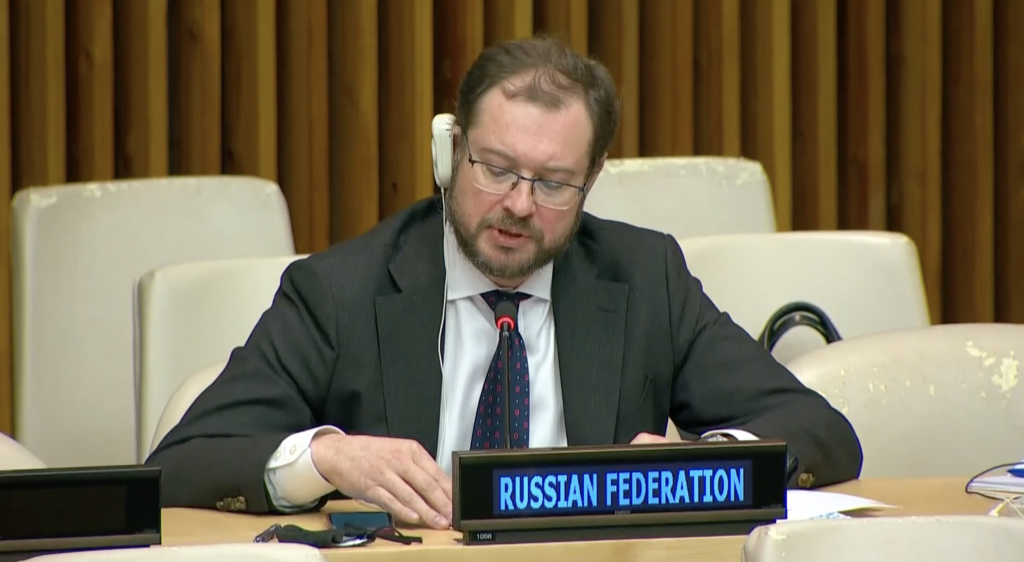Statement by Deputy Permanent Representative Dmitry Chumakov at an
Mr. President,
We would like to thank Mexico for convening this meeting, and the briefers for sharing their important observations and experience. Statements that some delegates made today negatively impact my mental health, but nevertheless I listened carefully to them. So now I kindly request that you also listen to what I have to say.
This issue is relevant for all persons affected by emergency events: military personnel (both those in service and retired), civilians including refugees and internally displaced persons, families of the killed and injured, peacekeepers, medical and humanitarian personnel.
In any such emergency, the help of psychologists is one of the most important components of stabilizing the situation. Stress factors associated with conflicts and disasters can lead to post-traumatic disorders, “turning off” people from normal life, depression, loneliness and aggression. In this context, it is important to properly train psychologists, including in psychological self-defense skills to avoid "professional burnout".
In Russia, along with the Health Ministry, the psychological service of the Ministry for Civil Defense and Emergency Situations (EMERCOM), consisting of more than one thousand experts, is closely involved in such assistance. Volunteers-psychologists from the public movement "Medical Volunteers" are also involved. Separately, taking into account the related specificities, psychological work in the armed forces is carried out by hundreds of specialized military and civilian experts. Also, emergency psychological assistance is being provided both via individual and group therapy, i.a. with the use of telemedicine. There are crisis hotlines, i.a. anonymous ones and hotlines for special contingents, such as women who went through violence. Differentiated personified account of professional, age-related, social, ethnic and other factors is required. Besides, it is essential that such efforts should cover maximum number of those affected, and coordinate psychiatric, psychological, and social services for long-term support, rehabilitation, re-socializing, as well as prevention of chronic stress-induced diseases.
The experience of the COVID-19 pandemic is now utilized, as well as the practice of working with non-Russian speakers, for example, from the Middle East region, including art therapy techniques for children.
Now, the work around the clock is underway on our territory to provide emergency psychological assistance to the population evacuated from the Donetsk and Luhansk People's Republics and the eastern regions of Ukraine. Only for the period from 18 February to 18 March, assistance was provided to more than 10 thousand people.
It is unfortunate that a number of delegations traditionally used this serious topic for their propaganda purposes. At the same time, they are silent about the repeated shelling by the Kiev military of psychiatric clinics in Donbass, the many years of life of this region’s people in war conditions, the documented crimes of nationalist battalions and their use of civilians as human shields. By the way, this terrorist tactic was clearly not borrowed from the Soviet army – but perhaps from military instructors that flooded Ukraine? And of course, in the context of mental health, colleagues did not consider it relevant to mention such facts as the atrocities in the Iraqi prison of Abu Ghraib or the airstrike on the hospital in Afghan Kunduz. Fact juggling, double standards and real psychological warfare have become the norm for them. Today's information attacks are a powerful planned blow on the minds and psychology of hundreds of millions of people in many countries, including Russian citizens, for which responsibility must also be sought for. Western Internet review by Mintpressnews.com attracted special attention as it traced in detail the entire chain of customers and producers of Ukrainian military propaganda.
Concerning the contribution of the UN Security Council to psychological support in situations on its agenda, we believe that it should be focused on taking this aspect into account when training peacekeepers and ensuring their work on the ground. As for elaboration of specific recommendations and coordination of efforts, these issues are more within the competence of the World Health Organization and the operational agencies of the UN humanitarian cluster – such as UNOCHA, UNHCR and UNICEF, which have the necessary expertise for this.
One last thing: among the synonyms to the notion “mentally sick”, there is such notion as “soul sick”. If the United Nations helps with healing of souls, huge progress will be made towards fulfilling the tasks of the Organization.
Thank you.
